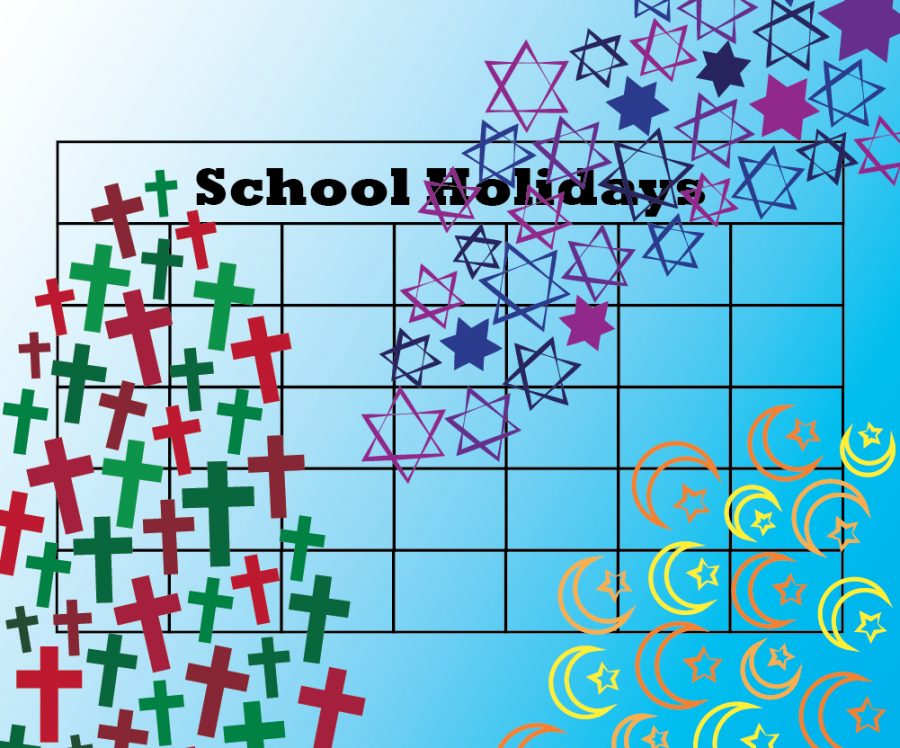[polldaddy poll=7457489]
by Elena Schwartz
As a banner hanging in Main St. reading “Respect, Diversity, Individuality” advertises, this school community is far from homogenous. This diversity entails a wide range of religions practiced by the student body and the faculty, and each religion comes with its own dose of high holidays.
In this country, there exists a foundational separation of church and state. Yet the reality is that some religious holidays are vacation days—the first day of Rosh Hashanah, Yom Kippur, Christmas, and Good Friday — while some are not honored in the school calendar.
Members of Judaism, Christianity, and Islam all feel accommodated to different degrees. Despite the school not observing every religious occasion, there are those who do choose to miss school to celebrate religious holidays such as the second day of Rosh Hashanah, Sukkot, and Eid-ul-fitr.
Junior Ethan Plotkin stayed home on the second day of Rosh Hashanah because his parents prefer he not attend school and “because I feel obligated to observe such an important celebration for my faith.”
Plotkin said that it was challenging to miss class, but because Rosh Hashanah fell during the first days of school, he had “limited homework to make up.”
Plotkin argued that the school system should give off the entire Jewish high holidays, considering Newton’s sizable Jewish population, saying, “It’s unacceptable for the school system to make devoted Jews, or people of any other religion for that matter, decide between school and religious devotion.”
Junior Rebecca Salganik also chose to stay home on the second day of Rosh Hashanah, as well as six days for Sukkot. As an orthodox Jew, Salganik was not able to do homework during those days and had to make it up.
But Salganik said she did not feel comfortable asking teachers or students for help “because I had taken days of vacation when they had school.”
Salganik, like Plotkin, advocated more vacation days to make religious observance easier.
“There aren’t that many Jewish holidays, probably only two weeks if you stacked all the days together,” she said. “I don’t think it’s so unrealistic to have those off.”
But according to Newton School Committee member Steve Siegel, giving off all holidays is impractical. In order to be eligible for state aide, “a very significant contributor to our school budget,” school must be in session for a minimum of 180 days, he said.
“So if we choose to make room for more religious holidays in the calendar we can do one of three things: start before Labor Day, run longer into June, or substitute religious holidays for one or more secular holidays or for winter or spring break,” said Siegal.
Junior Tommy Mobely, an observant Christian, said he personally felt accommodated by the current alignment of school vacations.
“Christmas falls during winter break, meaning it is always given off. Easter is on a Sunday and does not conflict with school. And this school gives off Good Friday. Those are the top three holidays in Christianity,” Mobely said.
Although his own religious needs are met by the school calendar, Mobely suggested that the school should give off “any holiday that entails someone having to go to services or do activities for their faith,” adding that homework should also be prohibited on such days.
“It is not fair if someone must do schoolwork on a holiday because they have a more important obligation,” he said. “And if they held school or gave out work, the people practicing the holiday would fall behind. That wouldn’t be fair.”
Siegel said that in determining which holidays to give off, the standard has been not the importance of a holiday on a religion’s calendar, but rather how large the holiday’s impact would be on school attendance.
In the case of Rosh Hashanah, for example, “imagine attending school when a third of the student population and perhaps a similar percentage of teachers are out observing the holiday,” said Siegel. In contrast, Siegel noted that the second day of Rosh Hashanah is not a school holiday in Newton “because a much smaller percentage of students and teachers spend this day in Temple.”
Each town makes their own policy regarding the school calendar, according to Siegel. In Brookline, for example, both days of Rosh Hashanah were given off, while in Watertown neither day was honored. Siegel said this difference reflects the observance of each school’s community.
In some cases, religious practice is too extensive to take time off from school. An example is the month of Ramadan, a Muslim holiday requiring observers to fast from sunrise to sunset for 30 days. In such situations, students and teachers must find a way to balance their religious observance with their time in school.
Senior Rafi Razzaque has fasted all 30 days of Ramadan since 7th grade. He has even fasted while playing a sport, on the occasions that Ramadan coincided with the cross country season.
“It’s not as awful as it sounds,” he said, “but takes some getting used to. Eventually, I get the skills and speed to keep up with varsity distance and speed-wise, even without water and food.”
When Ramadan overlaps with the school year, Razzaque said he uses lunch periods to catch up on sleep.
History teacher Subheen Razzaqui, who was born Muslim and abides by the Five Pillars of Islam (declaring that there is no god but Muhammad, practicing ritual prayer five times a day, fasting during the month of Ramadan, giving charity, and making the pilgrimage to Mecca at least once in a lifetime), also fasts for Ramadan.
“It is a month that is very joyous for Muslims,” said Razzaqui, “because one focuses on one’s soul and developing a closer relationship with the larger Muslim community.”
“The challenge of Ramadan is the lack of sleep,” she said. “During the month of Ramadan, most Muslims are more sleep-deprived than anything else. You must wake up before sunrise to eat, and in the evening there is a special meal to break the fast and special services at the mosque.”
According to Razzaqui, the vice principal sends out a memo to alert teachers to students’ observance.
As of now, this school does not formally recognize Eid-ul-fitr, the festival of the breaking of the fast at the end of the month of Ramadan, in the calendar. Eid (pronounced “eed”) means “festival” in Arabic. Eid-ul-fitr is a three day celebration, and “the Muslim equivalent of Christmas or Easter,” according to Razzaqui, because it has similar customs of giving and receiving gifts and spending time with one’s family and friends.
Razzaque advocated taking a day off to honor Eid, saying, “The school board should consider what the non-observers might have to learn by a holiday, if there is even the slightest degree of observation of that holiday. It would keep Newton the cultured, diverse, and respecting community that it is.”
Razzaqui, on the other hand, said that “the Muslim population at this school is not yet at the point where it should get recognition in the school calendar. If in 50 years it has grown significantly, that would be a different story.”
“There’s a difference between giving time off and recognizing a holiday,” she said. “Obviously, time off is the ultimate recognition, but it isn’t the only way to recognize a faith.”
Despite this, Razzaqui did note certain challenges that practicing her religion during the school year poses.
For example, Razzaqui uses both personal days that teachers are accorded each year to take time off to honor religious holidays.
“Other teachers have more flexibility to use their personal days as they like,” she said. “Because mine are used for my religious holidays I don’t have the same flexibility.”
Razzaqui, who prays five times a day, must also find time during the school day to observe this practice.
“Every prayer has a range of time when it can be said. So each prayer only requires five minutes out of a two hour time period,” she said. “And there is a place in the book room where I can go to pray during my free periods.”
“I’m proud of my religious practice, but I am also careful. I feel it’s very important not to make people of different faiths uncomfortable because of my beliefs.”
As the Muslim community grows in the U.S., there are more attempts by states to get school districts to recognize Muslim holidays. In Cambridge, there was a landmark campaign two years ago which resulted in a vacation day on the first day of Eid.
In the meantime, while Jews, Muslims, and other groups remain minorities in Newton, the school committee will continue to face pressure to reconcile the church’s (and synagogue’s, and mosque’s) holidays with the school year, and the religiously-observant will continue to balance their two schedules.











































